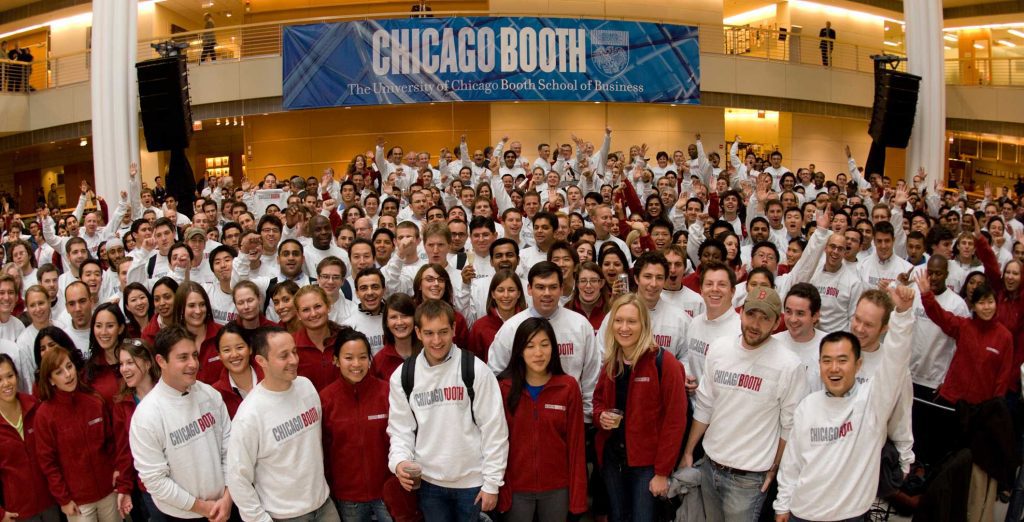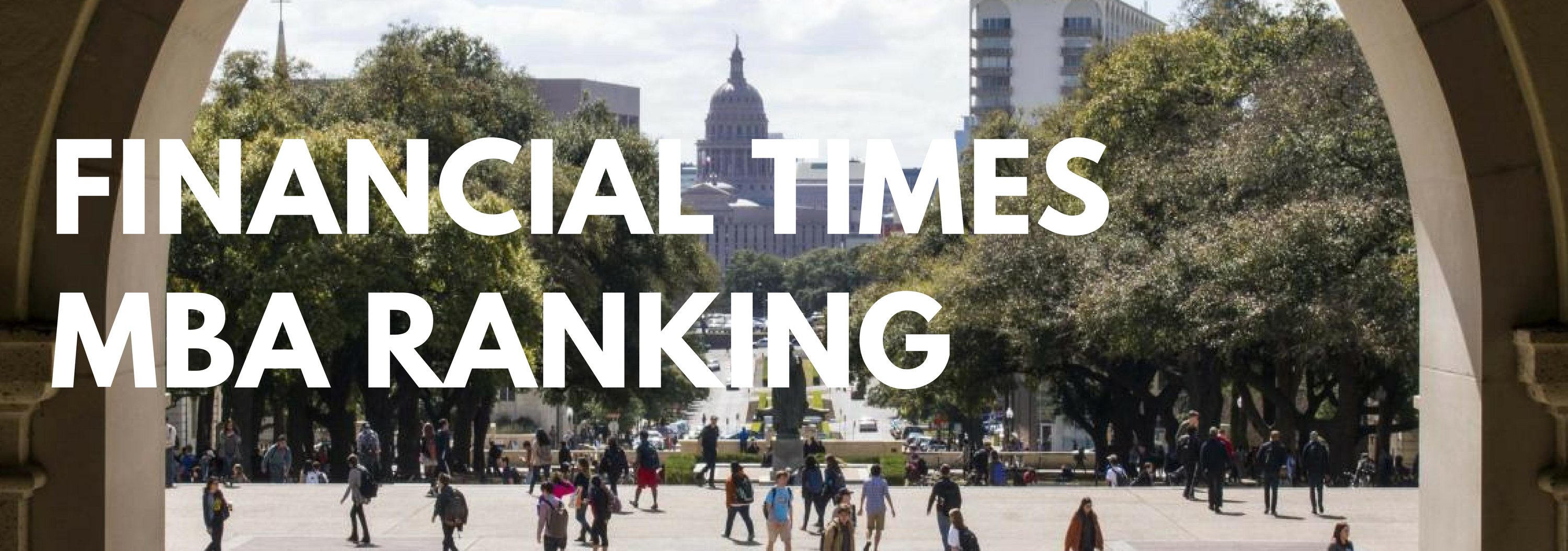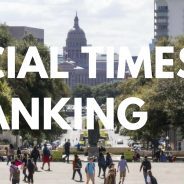Search results for yale som:
Chicago Booth, Michigan Rise in New U.S. News Business School Ranking
The new, official U.S. News & World Report ranking of the best business schools in the United States has been released, with some minor shake-ups at the top. For the second year in a row, Harvard Business School remains tied for the first overall in the ranking. However, the University of Chicago Booth School of Business officially supplanted The Wharton School at the University of Pennsylvania, which fell back from its tie at the top to third overall.
The rest of the top ten, as we previously mentioned, largely resembled last year’s U.S. News release, except for the inclusion of the Ross School of Business at the University of Michigan and the exclusion of the Yale School of Management. Surprisingly, Michigan Ross may have made the strongest showing in the newest ranking, not only managing a position in the top 10, but landing tied for seventh overall—ahead of Columbia Business School and the Dartmouth Tuck School of Business. The Yale School of Management slipped to a tie at 11th overall with Duke University’s Fuqua School of Business.
U.S. News & World Report 2019 Best Business School Rankings
| Rank | School |
|---|---|
| 1st (Tied) | Harvard Business School |
| 1st (Tied) | University of Chicago Booth School of Business |
| 3rd | The Wharton School at the University of Pennsylvania |
| 4th | Stanford GSB |
| 5th | MIT Sloan School of Management |
| 6th | Northwestern University Kellogg School of Management |
| 7th (Tied) | University of Michigan Stephen M. Ross Business School |
| 7th (Tied) | UC Berkeley Haas School of Business |
| 9th | Columbia Business School |
| 10th | Dartmouth College Tuck School of Business |
Chicago Booth, Michigan Shine Among Rising Full-Time MBA Programs

For the first time in school history, the Booth School of Business secured its place atop of the U.S. News ranking (albeit tied with HBS). In a statement, Booth Dean Madhav Rajan noted, “We are pleased to be recognized in this manner, and gratified that the recognition is across the board. We continue to strive to be the pre-eminent academic school of business.”
After its place among the top ten business schools was revealed, Michigan Ross Dean of Business Scott DeRue stated in a release, “We are excited to once again be ranked among the top 10 MBA programs in the country by U.S. News & World Report. This recognition is a testament to the extraordinary talent at Michigan Ross, our innovations in action-based learning, our partnerships with leading companies across the globe, and the most supportive alumni community in the world. We are developing leaders who have the character and capabilities to transform the world through business, and it’s an honor to be recognized among the very best in the world.”
On its website, the school also proudly boasted that, outside of Stanford GSB, no business school in the ranking earned more top ten placements in specialty areas, earning high grades for: “Accounting (No. 4), Entrepreneurship (No. 7), Finance (No. 10), International (No. 5), Management (No. 3), Marketing (No. 4), Non-Profit (No. 5), Productions/Operations (No. 3), and Supply Chain (No. 6).”
Outside of the top ten, the USC Marshall School of Business watched its stock rise again this year. Two years ago, U.S. News handed USC Marshall the 31st spot on its best business school ranking, which jumped to 24th last year, and 20th this year. Just a few spots back of USC was the Jones Graduate School of Business at Rice University, which saw the largest leap of any of the top 25 schools—jumping six spots from the previous year.
Nine schools among the top 100 in the new rankings managed to jump at least ten spots, including three MetroMBA favorites: the Whitman School of Management at Syracuse University, the Neeley School of Business at TCU, and the Fordham School of Business at Fordham University. Whitman, in fact, tied for second highest rise, improving 18 spots overall from last year’s 88th overall placement to 70th this year. No school improved more, however, than the Weatherhead School of Management at Case Western Reserve University in Cleveland, Ohio, which improved a remarkable 22 spots from last year’s 77th overall placement to 55th this year.

The Syracuse University Whitman School of Management jumped 18 spots in the most recent U.S. News “Best Business Schools” ranking.
A handful of schools also secured a spot in the top 100 after not appearing at all the previous year, including the Howard University School of Business, the American University Kogod School of Business, and Argyros School of Business and Economics at Chapman University.
Which Schools Fell The Hardest?
Along with the Yale School of Management losing its prestigious top ten status, a handful of schools tumbled in the 2019 ranking—with some virtually flat-lining. No school fell more than the Poole College of Management at North Carolina State University, slipping an astounding 35 spots from 55th last year to 92nd this year. Eleven schools lost their top 100 status in total. The reasoning behind the sudden drops are likely linked to the publication’s change in how it ranks the business schools.
In regards to the ranking methodology, U.S. News placed less value in test scores and student GPA. In a release this afternoon, U.S. News reported the following:
“For the first time U.S. News reduced the value of reported GPA, GRE and GMAT scores for full-time and part-time MBA programs and GRE scores in the education rankings if less than 50 percent of an entering class submitted these scores. U.S. News believes this lack of data means the scores are not representative of the entire class.”
The change, arguably, could stem from the fallout of the Temple University Fox School of Business, which was knocked off all of the publication’s rankings for the 2018 calendar year because of falsely reported data regarding test scores.
Stay tuned to MetroMBA on all the biggest MBA ranking news.
Financial Times MBA Rankings
 Bloomberg Ranking Forbes Ranking Economist Ranking U.S. News Ranking
Bloomberg Ranking Forbes Ranking Economist Ranking U.S. News Ranking
The Financial Times offers one of the world’s most comprehensive school ranking systems available, highlighting the world’s premiere full-time MBA programs. The annually released ranking organizes school programs according to 20 different criteria. Check out the publication’s 2022 rankings below.
| Ranking | School |
|---|---|
| 1 | The Wharton School |
| 2 | |
| 3 (tie) | |
| 3 (tie) | |
| 5 | Northwestern University: Kellogg (6) |
| 6 | Stanford GSB |
| 7 | University of Chicago: Booth (3) |
| 8 | London Business School (2) |
| 9 | Yale School of Management (4, tie) |
| 10 | IESE Business School (4, tie) |
| 11, tie | HEC Paris (7 tie) |
| 11, tie | MIT Sloan School of Management |
| 13 | SDA Bocconi (12) |
| 14, tie | New York University: Stern (13) |
| 14, tie | Berkeley Haas |
| 16 | CEIBS (7 tie) |
| 17 | Cornell University: Johnson (15) |
| 18 | Dartmouth College: Tuck (10) |
| 19 | Duke University: Fuqua (9) |
| 20 | University of Virginia: Darden (11) |
| 21 | National University of Singapore Business School (14) |
| 22 | University of Cambridge: Judge (16) |
| 23 | Carnegie Mellon: Tepper (27) |
| 24 | University of Michigan: Ross (21) |
| 25 | University of Southern California: Marshall (24) |
| 26 | UCLA Anderson |
| 27 | Georgetown University: McDonough (17, tie) |
| 28 | IMD Business School (19) |
| 29 | Washington University: Olin (25) |
| 30 | University of Washington: Foster (28) |
| 31 | University of Oxford: Saïd Business School (17, tie) |
| 32 (tie) | Fudan University School of Management (32, tie) |
| 32 (tie) | Indian School of Business (23) |
| 34 (tie) | Esade |
| 34 (tie) | Imperial College Business School (44, tie) |
| 36 | HKUST Business School (22) |
| 37 | Ohio State University: Fisher (56) |
| 38 | University of North Carolina: Kenan-Flagler (26) |
| 39 | Nanyang Business School, NTU Singapore (37) |
| 40 | IE Business School (39) |
| 41 | Vanderbilt University: Owen (31) |
| 42 | Peking University: Guanghua |
| 43 (tie) | University of Florida: Warrington (40, tie) |
| 43 (tie) | Alliance Manchester Business School (30) |
| 45 | Emory University: Goizueta (50) |
| 46 | University of Texas at Austin: McCombs (40, tie) |
| 47 | Rice University: Jones (32, tie) |
| 48 | University of Rochester: Simon (60) |
| 49 | University of California at Irvine: Merage (42) |
| 50 | CUHK Business School (48, tie) |
| 51 | Singapore Management University: Lee Kong Chian (58, tie) |
| 52 | ESCP Business School |
| 53 | Indian Institute of Management Bangalore (35, tie) |
| 54 | University of Notre Dame: Mendoza (69, tie) |
| 55 | Georgia Institute of Technology: Scheller (62) |
| 56 | Indiana University: Kelley (38) |
| 57 | Warwick Business School (32, tie) |
| 58 | Shanghai Jiao Tong University: Antai (53) |
| 59 | HKU Business School (29) |
| 60 (tie) | Pennsylvania State University: Smeal (47) |
| 60 (tie) | Tsinghua University School of Economics and Management (67) |
| 62 | Indian Institute of Management Ahmedabad (48, tie) |
| 63 | Boston University: Questrom (51) |
| 64 | Essec Business School (81) |
| 65 (tie) | Sungkyunkwan University GSB (35, tie) |
| 65 (tie) | Tongji University School of Economics and Management |
| 65 (tie) | Babson College: Olin (46) |
| 68 | Indian Institute of Management Calcutta (44, tie) |
| 69 (tie) | City, University of London, The Business School – Formerly Cass (61) |
| 69 (tie) | George Washington University (68) |
| 69 (tie) | Rutgers Business School (86) |
| 72 | Mannheim Business School (58, tie) |
| 73 | Edhec Business School (76, tie) |
| 74 | WHU – Otto Beisheim School of Management (54) |
| 75 | Arizona State: Carey (57) |
| 76 (tie) | University of St Gallen (64, tie) |
| 76 (tie) | Lancaster University Management School (96) |
| 76 (tie) | Boston College: Carroll (55) |
| 79 | University of Toronto: Rotman (75) |
| 80 | University of Georgia: Terry (87, tie) |
| 81 | University of Texas at Dallas: Jindal (73) |
| 82 (tie) | University of Pittsburgh: Katz (76, tie) |
| 82 (tie) | Brigham Young University: Marriott (71, tie) |
| 82 (tie) | University of Minnesota: Carlson (71, tie) |
| 85 | University of Maryland: Smith (52) |
| 86 | Rotterdam School of Management, Erasmus University (63) |
| 87 | Wisconsin School of Business (83) |
| 88 | ESMT Berlin (80) |
| 89 | EMLyon Business School (90) |
| 90 | McGill University: Desautels (91) |
| 91 | Politecnico di Milano School of Management |
| 92 | Western University: Ivey (97) |
| 93 | Miami Herbert Business School (93) |
| 94 | William & Mary: Mason (89) |
| 95 | Durham University Business School (74) |
| 96 | Texas A & M University: Mays (85) |
| 97 | Melbourne Business School (87, tie) |
| 98 | AGSM at UNSW Business School (79) |
| 99 | Queen’s University: Smith (100) |
| 100 | Ipade Business School (84) |
U.S. News Reveals Sneak Peek of Its 2019 Business School Rankings
With just over a week before U.S. News & World Report reveals its eagerly-anticipated 2019 best business school rankings, the publication offered a sneak peek of the business schools that managed to earn spots within the top 10.
Unsurprisingly, the top 10 of the 2019 rankings resembles the publication’s 2018 edition, with nine out of the top 10 schools nearing the top of the annual list. The lone ranking variation from 2018 to 2019 will be the University of Michigan Stephen M. Ross School of Business, which came in 11th in the previous year.
The top ten business schools for the 2019 U.S. News rankings are as follows (unordered):
- The Wharton School at the University of Pennsylvania
- Harvard Business School
- The Booth School of Business at the University of Chicago
- The Kellogg School of Management at Northwestern University
- The Ross School of Business at the University of Michigan
- The Tuck School of Business at Dartmouth University
- The Sloan School of Management at MIT
- The Stanford Graduate School of Business
- University of California—Berkeley (Haas)
The one school left out of the newest rankings from the previous edition was the Yale School of Management.
The publication will release the full list of the 2019 best business school rankings will officially arrive on March 20, 2018. Stay tuned for more updates on the rankings on MetroMBA.
The 5 Important Things You’ll Need to Know When Getting an MBA
If you’ve gone through the rigamarole of an MBA application, chances are you’re feeling a bit taxed (no pun intended). Don’t slow down now! Sometimes when you have your life and education under the microscope it’s helpful to get a gentle reminder from a reliable source—like us—of what you hoped to get out of the degree in the first place. Here are a few tips that might help calibrate your b-school compass:
Practice On The Field
Cliff Oxford, founder of the Oxford Center for Entrepreneurs, wrote in the New York Times that certain traditional MBA programs are “like having athletes studying game film but never practicing on the field.” This is why many schools encourage students to apply for internships during enrollment or summer semesters. These opportunities can be competitive—especially if you have your mind set on a large company—but don’t let that deter you.
There are many ways to stay connected with the global marketplace, where you will be employed in only two years. For starters, keep applying and remain alert to positions that may have a greater potential for longevity. Interviews that don’t lead to an internship are still essential experiences. If your chosen program doesn’t have adequate outlets for students to engage with employers, ask for them.
Let A Mentor Set The Pace
Mentorships reinforce the idea that there’s no substitute for experience. For students too intimidated to reach out to a professor, consider that mentorships may be the most rewarding part of their job.
Many schools offer a mentorship program built into the curriculum. Large schools like the University of Oregon and the University of Miami pair students with local professionals to “meet regularly throughout the academic year to discuss everything from study habits to career choices.” Schools have reported that these connections are pivotal for students in achieving their ideal positions and cultivating life-long relationships in the field.
Mentorship is also a staple of the career path designed for students at powerhouse business schools like the Yale School of Management, which recently revamped its WE@Yale program.
Change Your Perspective
When under pressure, remember to give yourself a break. Exercise and meditation are steadfast options, but use your imagination. Jerry Seinfeld reportedly displayed images from the Hubble Space Telescope on the walls of his writing room to calm his nerves. ”I don’t find being insignificant depressing. I find it uplifting.”
Completing your MBA is a personal exploration above all else. Don’t forget your true entrepreneurial spirit while finding your footing. After all, changing ones career is the second most common reason, according to students, that they pursue an MBA in a first place.
Experiment With Electives
Special projects and electives are a chance to step out of your comfort zone. These courses are updated on a yearly basis, meaning that they cover cutting-edge topics that can open up new worlds and help you garner skills that separate you from the rest.
For example, the Stern Signature Project at the NYU Stern Center for Business and Human Rights recently led students to create a business plan “focused on sustainable employment and profit” for a private Kenyan social enterprise.

The NYU Stern Center for Business and Human Rights launched in 2013, focusing on various issues like manufacturing, sustainability, and much more.
Get To Know Your Pack
A drive to succeed doesn’t mean that you have to be the lone wolf on Wall Street. Every MBA program has students who come from unique backgrounds, cultures, and histories. These are your future colleagues. They’re also hidden mentors who may be your most valuable supporters.
Many schools, like the Wharton School at the University of Pennsylvania, actively acclimate their students together with unique Olympic-like events, helping bridge the various cultural gaps of the incoming students. Not only are these events fun, unless you hate being outside or sack races, but they are potentially powerful networking events for you and your peers.
Comparing The U.S. News Full-Time and Online MBA Rankings
When it comes to business school rankings, U.S. News & World Report issues one of the most comprehensive annual lists. The annual rankings includes separate lists for the “Best Business Schools” and the “Best Online MBA Programs,” but deciding which format is right for you can still be tricky. Continue reading…
Social Impact MBAs: Programs That Help Students Make a Difference in the World
For years, social impact has been a growing area of emphasis at business schools. Increasingly, MBA students are stating that a well-paying career isn’t enough: They also want to make a difference.
As Sherryl Kuhlman, the managing director of the Social Impact Initiative at the University of Pennsylvania’s Wharton School, told U.S. News & World Report: “Our students want to make the world go round in a different way. [They are no longer willing to] take a job they don’t like so they can give their money away later. They want to merge the money and the purpose.”
MBA programs incorporate social impact into their programs in various ways, through global experiences, coursework, clubs, competitions, and more. MBA students may also have opportunities to team up with corporations, government agencies, and nonprofit organizations to get hands-on experience during their graduate studies.
So if you’re interested in social impact, what opportunities should you look for within an MBA program?
Centers and Initiatives
Some schools run entire centers and initiatives dedicated to the idea of social change. Typically, these centers provide the foundation around which a variety of social impact opportunities are built, including research, career help, events, and course development.
For example, the McCombs School of Business at UT Austin recently launched its Social Innovation Initiative, which provides students, faculty, and the community with preparation to promote social change. The initiative offers graduate-level curricular offerings, with courses such as “Energy Technology and Policy” and “Invisible Global Marketing.” There are also many extracurricular activities such as the Social Impact Investment Fund, a peer-created fund that provides financial support for MBA students pursuing internships in the social impact space.
“The creation of the Social Innovation Initiative is a crucial step in bringing UT’s overlapping communities together to collectively address the world’s most pressing challenges,” Dr. Meeta Kothare, managing director of the initiative, said in a press release. “The interdisciplinary nature of the initiative is key because the most impactful social innovations often result from collaborations among private, public, and social sectors.”
At Stanford Graduate School of Business (GSB), the Center for Social Innovation aims to bring about social and environmental change through research, education, and experiential learning opportunities. For MBA students, the center offers social innovation courses, study trips, the potential to participate in an investment committee, and fellowships to provide leadership opportunities. The school even hosts an annual ceremony each spring drawing together a tight-knit core of students, faculty, and alumni who share a commitment to social innovation. Three classes of awards are handed out to a dozen students at the event, and Dean Emeritus Arjay Miller, 101, attends to encourage the continuation of a community of social innovation he helped found at the GSB while dean from 1969 to 1976.
Then, there’s the Yale School of Management Program on Social Enterprise. This initiative supports faculty, students, alumni, and practitioners in their pursuit of using business skills to achieve social objectives. It does this by offering a span of programs including courses such as “Global Social Enterprise” and “Managing Sustainable Operations,” as well as research, conferences, and publications. For extracurricular activities, students can participate in the Social Impact Lab, a weekly forum with opportunities to engage with industry leaders and each other, as well as the Economic Development Symposium, an annual conference that brings together eminent scholars, action agents, and key opinion leaders to work on solutions to pressing economic development issues.
Programs
For many business schools, social entrepreneurship is offered part and parcel with their MBA degrees. These programs can range from a one-week social enterprise trip overseas to a formal concentration within the MBA program.
At Northwestern University’s Kellogg School of Management, MBA students can elect a Social Impact pathway concentration. This pathway is designed for students who want to create positive social change and includes required courses on a variety of topics from “Leadership and Crisis Management” to “Public Economics for Business Leaders” and “Health and Human Rights.” Within the pathway, there are three tracks: policy, nonprofit, and social innovation, each offering in-depth coursework to position students for their desired careers.
Meanwhile, MBA students at Emory’s Goizueta Business School can explore social impact through an annual seven- to 10-day Social Enterprise @ Goizueta Trip. These trips take students to countries around the world to observe the challenges that local economies face and develop market-based solutions. Alumni and evening MBA students can also travel to Nicaragua to visit coffee farms and meet growers. Full-time MBA students can visit Nicaragua or El Salvador to explore social enterprises on the ground and work on community health projects.
Competitions
Some schools offer hands-on experience in social impact to their students in the form of social venture competitions.
Through Harvard Business School (HBS)’s Social Enterprise Initiative, which aims to educate, inspire, and support leaders across all sectors to create social change, MBA students can participate in the New Venture Competition (NVC). The competition offers participants a grand prize of $50,000 as well as workshop opportunities, feedback, and business plan development advice.
Designed for students and alumni interested in using their business skills to create innovative approaches to tackling social problems, the Social Venture Competition at NYU Stern School of Business is similar to that of HBS’s NVC. Over the last 11 years it has awarded more than $900,000 to startup social ventures developed by students.
Clubs
Net Impact is one of the most popular social impact clubs, with chapters across the globe. More than 100,000 individuals have joined more than 300 chapters across the world to take on social challenges, protect the environment, and orient business toward social impact. The Net Impact chapter at UCLA Anderson School of Management, for example, has been awarded Gold Status, which recognizes it as a high-performing chapter and qualifies it to serve on the national Net Impact advisory board.
One of highlights of Net Impact is the annual Net Impact Conference, which welcomes attendees from across the globe to hear from keynote speakers, such as Clif Bar CEO Kevin Clearly and Derreck Kayongo, the CEO of the Center for Civil and Human Rights. Attendees at the Net Impact Conference can also take part in a variety of workshops, panels, and boot camps on topics ranging from civic engagement to equity.
In addition to Net Impact chapters, many MBA programs also offer their own social enterprise-focused student organizations. For example, the Social Enterprise Club at Columbia Business School connects students with faculty, alumni, professionals, and organizations to develop business skills and create social, environmental, and economic value.
Scholarships
At Oxford Saïd Business School, MBA students have the opportunity to apply for the Skoll Scholarship, a competitive award for students pursuing entrepreneurial solutions to urgent social and environmental challenges. The scholarship provides funding as well as opportunities for the award winners to meet and interact with world-renowned entrepreneurs, thought leaders, and investors. To qualify, an applicant must have three years of experience in social enterprise and be an incoming MBA student.
At Duke’s Fuqua Business School, there’s the CASE Social Sector Scholarship for incoming daytime MBA students. Scholarship recipients receive at least 25 percent tuition support as well as funding from the CASE Summer Internship Fund. Incoming MBA students who can demonstrate their commitment to applying their business skills in the pursuit of social impact are eligible to apply.
This is far from an exhaustive list—rather it’s a sampling of the wide-ranging opportunities to study social impact across MBA programs around the world. We hope it can provide a jumping off point as you begin to investigate social impact opportunities at your target schools.
This article has been edited and republished with permissions from Clear Admit.
Toronto’s Best Nonprofit MBA Options
It’s fair to say that the finance and consulting industries are the most popular for business school grads. But what about non-profits and social enterprises—where do they rank? While some assume that an MBA and working for a nonprofit do not go hand-in-hand, that’s not the case. Continue reading…
A Recommendation Revolution Is Underway in MBA Admissions: What You Need to Know
I’m busy, you’re busy, your boss is most definitely busy. Indeed, publications ranging from Men’s Health to the Atlantic, the Washington Post to Forbes are all reporting that “busyness“ has become the new status symbol for our times. Which is part of what makes asking someone to write you a letter of recommendation for business school so daunting. Now, try telling that person that you actually need five different letters for five different schools. Oy vey.
As uncomfortable a spot as it puts applicants in—it’s no better for recommenders. Even your most vociferous supporter is going to wonder what in the world she’s gotten herself into when she realizes that helping you in your pursuit of acceptance to business school means taking time away from work or play or family or whatever else to labor over leadership assessment grids, each a little different from the one before, and write 10 slightly different answers to 10 slightly different questions. Here’s hoping that your top-choice school doesn’t happen to be the last one she gets around to…
Good news. The graduate management education industry recognizes the strain that letters of recommendation put on applicants and recommenders alike and has been wrestling with ways to make the process easier for everyone involved. To this end, the Graduate Management Admission Council (GMAC) established a committee made up of admissions representatives from dozens of leading business schools to brainstorm about ways to lessen the burden while still collecting the third-party assessments of candidates that are so critical to the MBA application process.
GMAC Pilots Common MBA Letter of Recommendation
As an outgrowth of that committee’s work, GMAC last year piloted a common MBA letter of recommendation (LOR) that schools can choose to incorporate into their applications to reduce the burden placed on applicants and recommenders alike.
“The Common Letter of Recommendation (LOR) effort is intended to save you and recommenders valuable time by providing a single set of recommendation questions for each participating school,” reads the GMAC website. “This allows your recommenders to use the same answers for multiple letter submissions, alleviating the workload of having to answer different questions for each school multiple times. You benefit because it makes the ask for several different letters to be written on your behalf much easier.”
Cornell’s Johnson Graduate School of Management, NYU Stern School of Business, and Michigan’s Ross School of Business were among the first schools to pilot the Common LOR last year. In addition to a single set of open-ended essay questions, the pilot Common LOR also included a leadership assessment grid inviting recommenders to rate applicants on 16 “competencies and character traits” grouped into four main categories of achievement, influence, personal qualities and academic ability.
“At Johnson, we saw the Common LoR as a clear opportunity to improve the admissions process for candidates and their recommenders in a way that would also add value to our own assessment of applicants,” Judi Byers, Johnson executive director of admissions & financial aid, told Clear Admit. “A thorough and consistent review is important to us and the grid provides a straightforward base of insights that can be assessed and compared reliably while the accompanying letter adds meaningful detail and context,” she added.
Soojin Kwon, managing director of full-time MBA admissions and program at Ross, sees applicants and recommenders as the main beneficiaries of the Common LOR and is pleased that more schools are coming on board. “As more schools adopt it, applicants won’t have to feel like they’re burdening their recommender with completing multiple rec letters with different questions and ratings grids,” she told Clear Admit. “This year, more than a dozen of the top 20 schools are using it.”
Ross was also among the schools to first pilot the Common LOR last year, and Kwon served as part of the GMAC committee that helped craft it.
Common Questions Easy to Agree on, Common Leadership Grid Not
“What we found in using the Common LOR this year past year was that the questions gave us helpful insights into applicants, particularly on the important area of constructive feedback. The questions, however, were fairly similar to what we and other schools were using before, so it was easy for the AdCom to use it,” she notes.
Those questions are as follow:
- Please provide a brief description of your interaction with the applicant and, if applicable, the applicant’s role in your organization. (50 words)
- How does the performance of the applicant compare to that of other well-qualified individuals in similar roles? (E.g. what are the applicant’s principal strengths?) (500 words)
- Describe the most important piece of constructive feedback you have given the applicant. Please detail the circumstances and the applicant’s response. (500 words)
- Is there anything else we should know? (Optional)
“The rating grid was quite different from what we’d used in the past,” Kwon continued. “It was also the most difficult part for the GMAC advisory group to develop and get agreement upon. The group worked this past year to revise and simplify the grid so that AdComs could get more meaningful insights from it.”
This year, the 16 competencies and character traits from the original grid have been distilled to 12, with specific questions about analytical thinking and information seeking omitted. Johnson and Ross have both incorporated the revised leadership grid into the LOR distributed to applicants as part of their applications, as have most other schools that have this year decided to incorporate both the grid and open-ended essay question portions of the form. UT’s McCombs School of Business and Rice University’s Jones Graduate School of Business, notably, still seem to feature the earlier version of the leadership grid in their application, the one that calls on recommenders to assesses applicants on 16 competencies and traits.
HBS Class of 2019 Profile Reveals Subtle Shifts, New GRE Details
The official Harvard Business School (HBS) Class of 2019 profile is now out—capturing in numbers and pie charts the real live students who started class for the first time yesterday. Not a lot has shifted since HBS released its preliminary class profile earlier this summer, although the Class of 2019 now includes 928 students, suggesting that 13 of those the school was expecting to enroll when it originally reported the class size at 941 made other plans. There are 942 students in the Class of 2018, by comparison.
The percentage of minority students also slipped slightly, from 26 percent reported in the preliminary profile to 25 percent in the actual class (last year’s actual percentage was 26 percent). Female students comprise 42 percent of the class, as earlier reported, again down one percentage point from last year.
In terms of median GMAT, 730 is still HBS’s reported score. That’s the same as last year—and as predicted earlier in the summer. The score range reported included a low of 580 and a high of 790, with the middle 80 percent of the class falling between 700 and 770. Last year, the middle 80 percent was a shade lower, coming in between 690 and 760.
HBS Joins Wharton, Yale in Posting GRE Scores
New in the actual profile posted today are stats on GRE scores, marking the first time HBS has published such data. Chad Losee, the Managing Director of Admissions and Financial Aid, also made a point of sharing this information in a recent blog post, revealing that 12 percent of the class submitted GRE scores and the remaining 88 percent submitted GMAT scores.
“The GRE and GMAT are different tests … and we are truly indifferent about which one you submit,” Losee writes. “Really. We are familiar with each test. Choose the one that allows you to best show your strengths, then move on to the other parts of the application.”
According to the recently posted profile, median GRE scores for both verbal and quantitative at HBS were 164. The score range for verbal was 147 to 170, and the range for quantitative was 151 to 170. HBS did not provide information about the average writing score.
The Wharton School, too, shared GRE data for the first time this year, although specific details about what percentage of the class opted for one test over the other were not made available. Wharton reported average scores, not median scores: 163 verbal, 162 quantitative, and a 4.7 average writing score. The Yale School of Management (SOM) also included GRE test scores in its Class of 2019 profile (median verbal, 166; median quantitative, 164; middle 80 percent verbal, 157 to 170; middle 80 percent quantitative, 160 to 169.)
If three makes a trend—then a trend we have of leading schools emphatically underscoring that they are indeed test agnostic by including GRE scores within their official class profiles.
“We Know You’re Much More Than a Test Score”
In his post, Losee also took pains to underscore that much more than scores go into determining who joins the HBS class each year.
“We know you are much more than a test score,” he writes. “The whole application and interview process are designed to help us get to know you. We’re trying to imagine what you would contribute in the HBS classroom and community. As I’ve written before, our learning model depends on a wide range of talent and perspectives in each class—and we know that not all that talent is measurable in a test.”
Obviously unchanged from the preliminary profile were the total number of applications HBS received this year—10,351—a 6 percent uptick over last year. The profiles posted today and earlier this summer both cited an 11 percent admission rate—which would indicate that 1,138 students made the cut—and a 91 percent yield.
This story has been edited and republished with permissions from Clear Admit.
Top MBA Recruiters: Finding A Role With PepsiCo
PepsiCo is one of the most well-known companies in the world. Known as a top manufacturer, marketer, and distributor of soft drinks and snack foods, the company also serves as a top recruiter of MBA talent in the United States. Continue reading…
New NYU Stern Memory Study Says Put Away the Camera
The Stern School of Business at New York University recently explored the new research that explores how photographs might reinforce visual memory at the expense of non-visual memory.
Admissions Tip: Considering the Campus
Continuing our series of admissions tips geared towards those individuals who are just beginning to think about their MBA applications, we wanted to offer some advice on factors to consider with respect to a school’s facilities and location. Whether speaking with current students or touring the campus for yourself, it’s helpful to approach these information-gathering experiences with as clear a sense of what matters to you as possible.
What Bain & Company Looks for in MBA Hires
Bain & Company—widely considered one of the most elite consulting firms in the world—is a coveted post-MBA destination for students at top business schools in every part of the globe. Headquartered in Boston with 53 offices in 34 countries around the world, Bain employs more than 7,000 people and counts as its clients leading Fortune 500 companies, as well as nonprofit and government organizations. And business is booming.
According to Keith Bevans, Global Head of Consultant Recruiting, the company has grown at a rate of 15 percent a year for the past 20 years, with no slowdown in sight. “We hire a little over 400 consultants a year—and that growth comes from the top business schools in the world,” he says. While the company primarily targets top-20 schools for MBA recruiting, it hires from more than 60 schools around the world and is committed to finding the best talent wherever it can.
Bevans is a Bain-lifer. He started as an associate consultant out of MIT, where he earned his bachelor’s and master’s degrees in engineering. He left Bain to get his MBA at Harvard Business School but returned upon graduation and has been there ever since. For much of his career, he was a client-facing partner in the firm’s Performance Improvement practice, with a focus on processes to improve effectiveness and efficiencies. Now he’s putting that expertise to work for his own company, and he couldn’t be happier.
His allegiance to the firm is clear, and it’s based in great part on his intimate understanding of its culture, which he describes as steadfastly collaborative and supportive. And he’s not alone. Bain frequently tops the “Best Places to Work” lists for Glassdoor, Vault and Consulting magazine, with employees praising its “great people and culture” and calling it “an incredible place to learn” and “the best place to start your career.”
It’s people, too, set Bain apart, Bevans agrees. “They are very smart, very passionate, maniacally focused on making a difference in whatever they are doing—and they wrap all of that in a layer of humility, which I think is very rare to find.”

Bain Partner Keith Bevans, Global Head of Consultant Recruiting
But interns alone are not enough to keep up with Bain’s growth. “It varies from year to year in terms of how many of our full-time hires are former summer interns, new full-time hires or former consultants. But the internship program never fills up the whole group.”MBA graduates are a big and important part of the company’s hiring, and many start out as interns in the 10-week summer associate program between their first and second years of business school. “It’s definitely an important on-ramp,” he says of the internship program, adding that it’s also a valuable opportunity for both Bain and its interns to determine fit. Notably, 90 percent of interns return to work for Bain full-time, Bevans adds. And there’s not a maximum cap on intern hires. “Our summer program is limited only by how many great students we can find,” he says. “We don’t have a target—rather I like to think of it as a minimum. If we find more great people, we will always go over whatever we set out for.” Which means there are opportunities for second-year students who may not have targeted Bain or consulting in their first year.
But interns alone are not enough to keep up with Bain’s growth. “It varies from year to year in terms of how many of our full-time hires are former summer interns, new full-time hires or former consultants. But the internship program never fills up the whole group.”
Don’t miss Clear Admit’s exclusive interview with Bevans, in which he talks about the firm’s commitment to employee training and support, goes into detail about Bain’s MBA recruiting process, shares where he looks and what he looks for in MBA hires and more. Our thanks to Bevans for making the time to share more about Bain with the Clear Admit audience.
Corporate Recruiter Q&A: Bain & Company’s Keith Bevans
Clear Admit: What sets Bain apart—not only among other consulting firms but also as an employer or company overall?
Keith Bevans: There are a couple of things about Bain people that set us apart. In my role, I have had the opportunity to travel to offices around the world hiring people, and what I have found is that Bain people are passionate about both the work they are doing and the things they are doing outside of work. They really jump right in with both feet. When you align that around our goal of having our clients be successful, you can really see the passion Bainies have for their clients—it just oozes out of them. We are having a big impact on our clients, and we are hiring people who are really energized by that.
With that as our starting point, we put them in an environment where we really do act like one team and do everything we can to support them in their professional life. From our global training programs to our onboarding program to the career counseling we provide—it’s all aligned around helping them be successful and be the best they can be. Bain people are people who want to have an impact.
Relative to other firms I think we are different in the sense that we have a very collaborative culture. We also have tremendously deep expertise in every major sector of the economy, and we bring that to our clients. “We’ve studied this and analyzed this, but why don’t we marry that with your expertise?” we’ll say to clients. We are not trying to prove that we are smarter than our clients but to work collaboratively with them to position them to succeed.
CA: How important are MBAs in your overall hiring? How many MBAs do you hire each year, both interns and full-time? Are you continuing to grow at the 15 percent rate you’ve enjoyed for so many years?
KB: MBA talent is a big and really important source of talent for us. For the last 20 years, we have been growing on average at a rate of 15 percent per year. That makes for a phenomenal slide when I put it in front of recruits. We hire a little over 400 consultants a year, and that growth comes from the top business schools in the world. The bulk of our targeted efforts focus on top 20 programs, but we have hired from almost 60 different MBA programs around the world.
With our growth, our primary focus is to make sure we are finding the most talented people out there. The breadth of schools from which we’ve hired shows that we are continuing to do innovative things through the Bain Passport and Webinar series to connect with students wherever they are. Our intern program this summer is once again—for the third or fourth year in a row—the largest we have run as a firm. It is definitely an important on-ramp, if you will. And 90 percent of the MBA interns who come for the summer return to Bain afterwards. We find the best, bring them in for the summer and very often they start their careers with us.
As for the 10 percent who don’t return—most of the time it’s actually more of a mutual thing. Maybe they tried consulting and decided it’s not a fit for them. And here’s another example of the supportive part about Bain: Even the interns who don’t come back often get support from the people who worked with them at Bain. They help them identify what parts of the internship were the right fit, and what roles might be a better match and then they help connect them with people who can help. After all, they are still Bain alums and still part of the Bain family.
Which Graduate Business School Students Have The Highest GMAT Scores?
Along with required work experience and undergraduate prerequisites, prospective MBA students also look at the average scores on the Graduate Management Admission Test (GMAT) for a certain school they are interested in applying to.
According the Graduate Management Admission Council, the exam is used as part of the admissions process for more than 6,100 graduate programs around the world. A GMAC study found that 261,248 GMAT exams were taken by prospective MBA students during the 2016 test year. The report also shows that less than 30 percent of scores were 650 or higher. The GMAT has a maximum score of 800. Continue reading…
Chicago Booth Names Stanford GSB Professor as Its Next Dean
The path from the Stanford Graduate School of Business (GSB) to the University of Chicago Booth School of Business is becoming well worn, as Chicago Booth prepares to welcome its second consecutive dean from the Palo Alto campus. Madhav Rajan, who chairs the accounting department at Stanford GSB and served as Senior Associate Dean for academic affairs from 2010 to 2016, will take the helm at Booth on July 1, the school announced yesterday.
Sunil Kumar, who served as Chicago Booth’s dean from 2011 until leaving to become provost of Johns Hopkins University in July 2016, also came from Stanford, where spent 14 years, ultimately in the role of Senior Associate Dean. Since his departure, Douglas Skinner, also an accounting professor, has served as Interim Dean as Chicago Booth conducted a global search for a successor.
“We sought the most outstanding candidate whose values, ambition and abilities fully comport with the distinctiveness of Chicago Booth as one of methodological rigor in its research and education, and through that commitment one of high impact on the world,” President Robert J. Zimmer and Provost Daniel Diermeier said in a statement announcing Rajan’s appointment yesterday.
As Senior Associate Dean for academic affairs at Stanford GSB, Rajan led the school’s MBA program, including overseeing admissions, curriculum, the student experience and career management. While at the GSB, Rajan also launched new joint-degree programs with Stanford’s engineering school and led initiatives toward greater integration of the business school within the larger university.
He also served as boss to Derrick Bolton, Stanford’s long-serving Admissions Director. In an interview with Clear Admit in August 2016, Rajan shared that he had, in fact, pushed Bolton to pursue other opportunities, perhaps contributing to Bolton’s decision to leave the GSB this past September to head the recently launched Knight-Hennessey Scholars Program.
“I had been encouraging him to think about other things he could do because it is a difficult job and he has been doing it for 15 years,” Rajan told Clear Admit. “The way he does it, the intensity he brings to it, the effort level—I was amazed that he did it for as long as he did it.”
A Compassionate, Supportive Leader
Rajan’s comments to Clear Admit suggest that he is a compassionate, supportive leader who offers those who work for him the autonomy to chart their own course. Of Bolton he said, “There is literally nobody at the GSB who works harder than Derrick. The amount of time, love and dedication that he puts into admissions is amazing and beyond what anyone could be expected to do. That level of commitment I have never seen from anybody, frankly.”
Asked if Bolton’s replacement (who has yet to be named) might change the school’s enduring essay prompt, Rajan offered further insight into how he leads. “That will be completely up to the new admissions director,” he said. “We have very much a notion of empowering people in their roles here, and the person hired to manage admissions will have complete latitude to run things the way he or she sees fit.”
A Beloved Teacher and Respected Scholar
Rajan has also won accolades for his teaching. In 2000, the University of Pennsylvania’s Wharton School bestowed upon him the David W. Hauck Award, its undergraduate teaching award. He taught at Wharton before Stanford, from 1990 to 2000. Next month, he is also slated to receive the Robert T. Davis Award for lifetime service and achievement, the GSB’s highest faculty recognition.
Rajan holds a bachelor’s degree from the University of Madras in his native India, as well as two master’s degrees and a Ph.D. from Carnegie Mellon University. His research has focused primarily on analyzing management accounting issues through an economics lens, especially as they relate to the choice of internal control and performance systems in firms. Cost Accounting: A Managerial Emphasis, which he co-authored, is the leading cost accounting textbook used around the world. He also served as editor of the Accounting Review from 2002 to 2008.
Returning to a School on the Rise
Rajan is not a stranger to Chicago Booth, having served as a visiting professor in 2007-08. In a release announcing his appointment, he expressed his respect for the school and his excitement to return. “The values I have in research and education are deeply valued at Chicago Booth,” he said. “People come here to do rigorous, empirically based research and analysis, which provides the basis for a transformative student experience and an extremely effective MBA curriculum. We have an exciting opportunity to take Booth’s deep strengths and leverage them here and around the world. I am thrilled to have the chance to be dean at what is unquestionably the greatest academic business school.”
Chicago Booth has been something of a rising star among leading MBA programs over the past decade, threatening Wharton’s previously undisputed place alongside Stanford and Harvard Business School (HBS) as the best business schools in the world. The Economist has ranked Chicago Booth the number one business school for five years running, from 2012 to 2016. And in last year’s U.S. News & World Report ranking, Booth tied with Stanford for second, behind HBS and ahead of Wharton.
Chicago Booth’s upward trajectory began under Edward Snyder, who preceded Kumar as dean from 2001 to 2010. In that time, the school almost doubled its number of endowed professorships, more than tripled its scholarship assistance to students, moved to a new Hyde Park campus, expanded its presence in Singapore, established a new campus in London, successfully completed a capital campaign and more than doubled its endowment. Snyder also successfully courted an unprecedented $300 million naming gift from alumnus David Booth before leaving to lead the Yale School of Management. Kumar continued that momentum, helping raise more than $300 million, focusing on student recruitment—including increasing the female enrollment of full-time programs from 35 percent to 42 percent—and expanding courses for undergraduates. Now it’s Rajan’s turn to take the baton. It will be interesting to see what his leadership holds in store.
This article has been edited and republished with permissions from Clear Admit.
Anxiety Persists for MBAs Despite Court Rebuke of Immigration Ban
Last week, a three-member panel of judges from the U.S. Court of Appeals for the Ninth Circuit refused the Trump administration’s call to reinstate a ban barring the entry of all refugees and visitors from seven predominantly Muslim countries into the United States. Although the case could still advance to the Supreme Court, yesterday’s ruling means that, for now, the executive order signed by President Donald Trump two weeks ago remains unenforceable.
That’s good news for international students from the affected countries, some of whom were detained at airports attempting to return to campus from overseas travel, others of whom were forced to cancel plans to leave the United States for fear they might not be allowed back in.
States Cite Harm to Higher Education as Major Reason for Opposing Ban
In affirming that the states of Washington and Minnesota had legal standing to bring the case against the immigration ban, the appellate judges specifically cited the ban’s injurious impact on the states’ public universities.
An excerpt from the ruling:
“Specifically, the States allege that the teaching and research missions of their universities are harmed by the Executive Order’s effect on their faculty and students who are nationals of the seven affected countries. These students and faculty cannot travel for research, academic collaboration, or for personal reasons, and their families abroad cannot visit. Some have been stranded outside the country, unable to return to the universities at all. The schools cannot consider attractive student candidates and cannot hire faculty from the seven affected countries, which they have done in the past.”
Citing the new court precedent, the judges argued that schools can assert the rights of their students. “The interests of the states’ universities here are aligned with the students. The students’ educational success is ‘inextricably bound up’ in the universities’ capacity to teach them,” the ruling says. “And the universities’ reputations depend on the success of their professors’ research.”
Of course, these concerns were not limited to public universities in the states of Washington and Minnesota. Indeed, as reported here, business schools around the nation were quick to decry the executive order on precisely those grounds. In the days immediately following Trump’s January 27 executive order, deans from Harvard Business School, UC Berkeley’s Haas School of Business, the University of Michigan’s Ross School of Business, the University of Pennsylvania’s Wharton School, NYU Stern School of Business and Columbia Business School, among others, spoke out strongly in opposition to the immigration ban while pledging to support their own affected students.
Global Business Education Is Best Antidote to Economic Nationalism, Say Business School Deans
Earlier this week, the Global Network for Advanced Management, a group of 29 international business schools committed to advancing innovation through global exchange, issued a statement in opposition to the current rise of populism, economic nationalism and anti-globalization rhetoric, noting that the global economy is more interconnected than ever before, making global exchange and engagement more important than ever.
Excerpt from the Global Network letter:
“As deans of Global Network member schools, we recognize that the fundamental drivers of global business are not changing. Technology will continue to advance and disrupt markets and societies, and the transfer of innovations and expertise across borders will continue. We believe that countries that retrench will harm themselves and their citizens. Therefore, we redouble our commitment to collaborative learning across countries and cultures, and to gain and leverage the insights of the best and brightest throughout the world. In this way, we continue to improve educational outcomes and professional development of our students, deliver innovations that benefit business and society, and contribute to a better world.”
This letter carried the signatures of deans from Haas, HEC Paris, INSEAD, Oxford’s Saïd Business School and Yale School of Management, among many others.
In the wake of the executive order, Haas Dean Richard Lyons received a letter signed by more than 1,000 Haas MBA students requesting that he reach out to deans of other business schools to speak out jointly against the executive order. He responded early last week to the Haas community that he had done just that.
Heightened Anxiety Persists
Despite yesterday’s ruling, business schools have encouraged their international students to exercise caution with regard to planned travel outside of the United States. “The temporary restraining order, which halted the enforcement of certain provisions of President Trump’s executive order banning foreign nationals from seven countries from entering the U.S., remains in effect after a decision by the 9th Circuit Court of Appeals,” read a notice posted today on the Harvard International Office (HIO) website. “Despite this ruling, the HIO continues to advise foreign nationals from the seven restricted countries (Iran, Iraq, Libya, Somalia, Sudan, Syria and Yemen) to exercise caution and discuss any travel plans with their HIO Advisor when considering travel outside the United States.”
This is because future court rulings could reinstate the ban, in which case foreign nationals from those countries most likely would not be admitted or readmitted to the country.
Next Year’s International Enrollment at U.S. Business Schools in Question
It remains to be seen what type of impact this uncertainty may have on international enrollment at U.S. business school’s next year. As of this writing, most business schools we reached reported that, thus far, international application volume had not been impacted.
“International application volume in Round 2 was identical to last year,” says Haas Assistant Dean of the full-time MBA Program and Admissions Peter Johnson. “Since our Round 2 deadline was in early January, it was after the election and before the recent executive order. If there is any direct impact from these events, it will likely be seen in the enrollment patterns of admitted international students, in our program and in other MBA programs across the country.”
Concern about the current administration’s policies and their impact on international students has been widespread. “The uncertainty and anxiety surrounding changes in visa and immigration regulations is affecting all international students, not only those from the countries included in the recent executive order,” says Johnson. “We have had questions ranging from ‘Will this impact my chances of admission?’ to ‘Will I be able to do an internship in the U.S.?’”
Johnson confirmed that Haas has no plans to alter its admissions process and will continue to offer spaces in its class to top candidates regardless of their country of origin. “We are committed to maintaining a diverse and inclusive environment, and international students and faculty are an important part of our community and the educational experience of all students,” he pledged.
HBS Managing Director of Admissions and Financial Aid Chad Losee made a similar pledge in a post to his Director’s Blog earlier this week. In it, he reaffirmed the school’s commitment to assembling a diverse class of leaders who will make a difference in the world, wherever they come from. “The recent U.S. executive order restricting travel to America for citizens from certain countries does not change this, nor are we changing our admissions policy or practices as a result,” he wrote.
This article has been edited and republished with permissions from Clear Admit.
Does An Undergraduate Major Matter When Earning An MBA?
When considering earning an MBA, it’s impossible not to wonder if your undergraduate degree may hold you back.
Hot MBA Jobs – Nonprofit Fundraiser
It goes without saying—everybody likes making money. But while everyone loves some extra change in their bank accounts, some really get a sense of accomplishment working directly for a cause or nonprofit corporation.


















